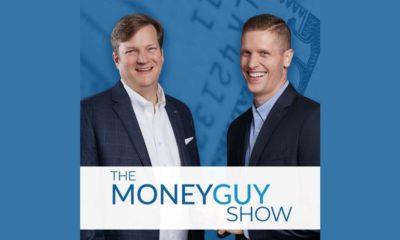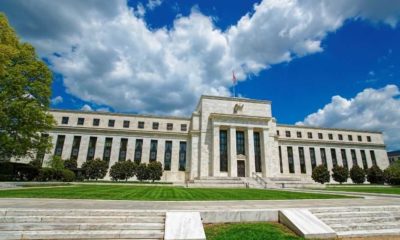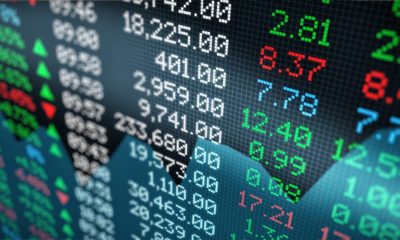Business
Market Strategists Were Half Right About 2016…And Half Wrong

Remember back on New Year’s Eve?
You were with your family or friends making resolutions of all the great things that were going to happen in the new year.
Now imagine for a minute that you knew back then that the United Kingdom would vote to leave the European Union.
Imagine that you knew there would be an uprising from the Turkish army, you knew Brazil’s president would fall, and you knew that terrorism would run rampant in Nice and Brussels.
What would you think our economy would like today?
Do you say that you would have had the ability to be able to predict that the S&P 500 Index would be holding yield premiums for the global corporate bond that are very close the narrowest they’ve been seen in a year’s time?
Would you have predicted the market currencies would today be 8 percent above the lows they had back in January?
Analysis
This is what forecasters are facing at the moment.
Their predictions surrounding the fact that the year 2016 was going to be filled with political danger as mostly proven right.
However, the issue arises when they have been correct on their prediction of the world and mostly incorrect when trying to call the markets accurately.
One example of how impossible predicting the markets accurately in today’s world where central bank stimuli dominate are:
- The slow economic growth
- The subzero bond yields
Bill Stone stated over the phone that others probably would have done a worse job predicting the markets if they knew what was going to happen this year.
He further said that recent events reflect the pointlessness of making decisions about investment simply by looking at geopolitical outcomes.
Monetary stimulus has been the fuel for risky assets since the financial crisis began.
At the same time, it has managed to keep economies afloat but drifting.
The monetary stimulus ranges from cuts in interest rates all the way to the bond purchases have quickly filled up the balance sheets of major central banks since 2009 by approximately $7.2 trillion.
Policymakers, however, have remained generous following all the drama surrounding politics this year.
This has resulted in markets becoming increasingly vague when the traditionally used models of investment are used to view these markets.
For example, look at the United States stock market.
Valuations rose over twenty times earnings.
It has not done this in twenty years.
Profits are either declining or remaining the same.
Takeovers and share buybacks have begun to calm down. Amidst:
- The United Kingdom leaving the European Union
- The attack in Nice
- Turkey’s army uprising
The S&P 500 over the past three weeks straight has rallied.
It closed at a record, something it has not done in 13 months.
Last Wednesday, at 9:33 a.m. it slipped to 2,171.05 in New York, a .1 percent fall.
The United States’ economy’s refusal to experience another recession is one of the primary factors for this rebound.
Conditioning is another factor.
Thinking about protracted declines has not come with a payoff since the current financial situation started.
This is in part due to the central banks willingness to curtail losses.
[ms_divider style=”normal” align=”left” width=”100%” margin_top=”30″ margin_bottom=”30″ border_size=”5″ border_color=”#f2f2f2″ icon=”” class=”” id=””][/ms_divider]
[ms_featurebox style=”4″ title_font_size=”18″ title_color=”#2b2b2b” icon_circle=”no” icon_size=”46″ title=”Recommended Link” icon=”” alignment=”left” icon_animation_type=”” icon_color=”” icon_background_color=”” icon_border_color=”” icon_border_width=”0″ flip_icon=”none” spinning_icon=”no” icon_image=”” icon_image_width=”0″ icon_image_height=”” link_url=”https://offers.thecapitalist.com/p/58-billion-stock-steal/index” link_target=”_blank” link_text=”Click Here To Find Out What It Is…” link_color=”#4885bf” content_color=”” content_box_background_color=”” class=”” id=””]This one stock is quietly earning 100s of percent in the gold bull market. It's already up 294% [/ms_featurebox]
[ms_divider style=”normal” align=”left” width=”100%” margin_top=”30″ margin_bottom=”30″ border_size=”5″ border_color=”#f2f2f2″ icon=”” class=”” id=””][/ms_divider]
Debate
Ben Mandel said that part of the resilience is coming from the fact that policymakers are on top of it.
He says that they have been aggressive when it comes to responding to political shocks.
He also says that ultimately, a limit exists.
The best on where that limit may be have not panned out quite yet.
Morgan Stanley and Andrew Sheets proposed in may another options in opposition to the adage “sell in May.”
They encouraged clients to look at positions that would benefit from rising volatility and invest there.
At the same time, Savita Subramanian proposed that June would carry a number of pessimistic headlines that could potentially push stocks even lower.
Savita Subramanian is the chief equity strategist at the Bank of America Corp.
She was only half right.
In the two days after the United Kingdom’s decision to leave the European Union, there was a 5.3% decline in the S&P 500.
The Volatility Index of the CBOE rose around 49 percent.
This was the highest it had been since it hit its peak back in February.
However, it took less than a week for the rise to be erased.
Last Wednesday, the gauge for fear closed at 11.77; this is the lowest that it has been lowest it has been in nearly two years.
Markets Right Now
The markets are almost too quiet at the current time.
The Chicago Board Options Exchange’s Volatility Index measures the amount of volatility that is implied within the market.
The S&P 500 stock index has not moved more than one percent in any direction for more than a month.
The following shows an example of the bank bailouts in 2008, an example of volatility in the economic and stock worlds.

Earlier in the year, people were worried about some different things.
They were worried about the rise of corporate defaults, the Chinese experiencing a hard landing, and the central banks running out of ammo.
Most of these concerns have been put away for a later time.
However, some strategists are saying that this is merely the calm before the storm.
Subramanian, on top of her prediction for the negative headlines in June, made a few other comments as well.
She stated we were getting a little closer to the most polarized election that has been seen during their careers that every day.
She said that one thing they had noticed six months ahead of the voting month was that the market peaks and then start to move downward.
She further added that the Fed, during a recession for corporate profits, is tightening.
She said that this is not typical.
Andrew sheets also foresaw trouble coming our way for the summer.
He wrote a note to one of his client’s offering an alternative to the “Sell in May go away” adage.
He said that pulling out of stocks during the months of May through November has worked for people in the past.
He did give credit that there were some dramatic declines that typically took place during this time.
However, this was in opposition to a generalized weakness for this period of the year.
He stated that it was butter to buy volatility in the month of May.
Sheets and Subramanian both see reasons that investors should remain cautious during 2016.
He says that a more cautious way to get involved would be to put spreads on the high-yield debt in the United States, focus on emerging markets, and call options on the S&P 5000.
Market Revival?
Corporate bonds have a similar story to tell.
Investors are demanding an extra yield to make up for the risk to their credit has contracted to nearly the lowest it has been this year.
From Brazil to Russia, one MSCI index showing emerging-market currencies shows that these have rebounded in January from a little that lasted six years.
Below is an example of major developing economies from 1990-2012:

Dangers are beginning to dwindle.
One index that is tracking the amount of exposure seventy-seven different countries have to the risk of politic drama is reflecting the largest readings in the past ten years.
The Eurasia Group made this statement, a research firm based in New York.
These scores are estimated through surveys that are conducted monthly.
These studies address such topics as the amount of exposure seventy-seven different countries have to political risk is showing some of the biggest readings in the past ten years, according to the Russia Group.
The Eurasia Group is a research firm that is based in New York.
These scores are calculated through surveys that are conducted monthly.
These reviews address such topics as:
- Investment Policy
- Social Stability
- Government Stability
- Economic Policies
- Security
Investors used to demand solid returns to compensate them for the increased amount of uncertainty surrounding politics.
This request has weakened because of central-bank money.
The European Central Bank and Bank of Japan’s purchased assets are not only pushing yields around $10 trillion of the global debt below zero.
They have also managed to pushed investors into dodgier terrain and away from government bonds.
These investors are moving toward emerging markets, stocks, and corporate bonds.
On its Head
Bhanu Baweja is the head of emerging market and cross-asset strategy at the London-based UBS.
Baweja states that the world in one in which fixed income is becoming the norm to gain an appreciation of capital.
She further says that we are turning to equities to revive our yield, referring to it as a world upside-down.
The S&P 500 is around 2.1 percent.
This gives it dividend yield that is higher than where the 10-year Treasury stands at .05 percent.
Earlier in the month, the gap reached to one of the broadest levels that has ever been seen.
Simultaneously, the exchange-traded fund for the 20+ year iShares Treasury Bond posted a return that was approximately 16 percent this year.
Compare this with the 7.6% rise in the S&P 500.
As policymakers rely heavily on unusual measures to fight off pending recessions, the likelihood for falsification increases.
For years rates have managed to stay at lows that were recorded.
However, the global growth and economies all over the world continue to struggle and tiptoe around a dangerous downward spiral.
This month, an official from the Bank of England said that material easing was most likely, and the sledgehammer could be used.
It is speculated by economists that Japan is considering helicopter money.
Helicopter money is here fiscal stimulus is funded by the money printing conducted by the central banks.
Helicopter Money?
There are a few positives to using helicopter money.
This type of program does not increase tax burdens for the future.
Helicopter money can also lift the inflation expectations that seem to stay too low.
They can boost the speed in which money circulates throughout the economy and provide more of a kick.
Bonds from banks puts money into the overall financial systems.
This limits the impact this cash will have on the economy because consumers are cautious, and companies would rather spend it.
The following shows the world GDP per capita up to 2008:

Even the Fed’s policymakers stressed the fact that there was no rush to raise the costs of borrowing once again.
The Fed is the one central bank that is attempting to deter investors away from attaining easy money.
Experience?
Emerging-market investors are one constituency that is already used to risks from the political world.
The past couple of years has seen them juggling with falling oil prices, numerous corruption scandals taking place in the disputes between Brazil and Russia and Turkey and the Ukraine.
The stocks they hold show this fact: There has been a 10 percent gain for the emerging market index for the MSCI.
The price of Brent crude oil from 1998-2015 can be found below.

For the emerging-market investors, this year has just been another year of conducting business.
Some investors believe, in fact, that bonds and the developing market stocks are going to be the ones that show the most resilience to the fallout from the United Kingdom’s vote to exit the European Union and the volatility around the elections in the United States.
They are saying that nations who are industrialized are going to be able to keep their rates low.
Over $18 billion found its way to the emerging markets following the United Kingdom’s vote took place.
Andrew MacFarlane is an emerging markets credits strategist.
He is employed by BNP Paribas SA located in London.
He said that the market remains extremely focused on the overall yield.
He further states that the market has turned its focus off of numerous factors that are essential.
He says that when you are eager to see a return for the money you have invested, you are usually willing to look past things you would have paid more attention to in other circumstances.















